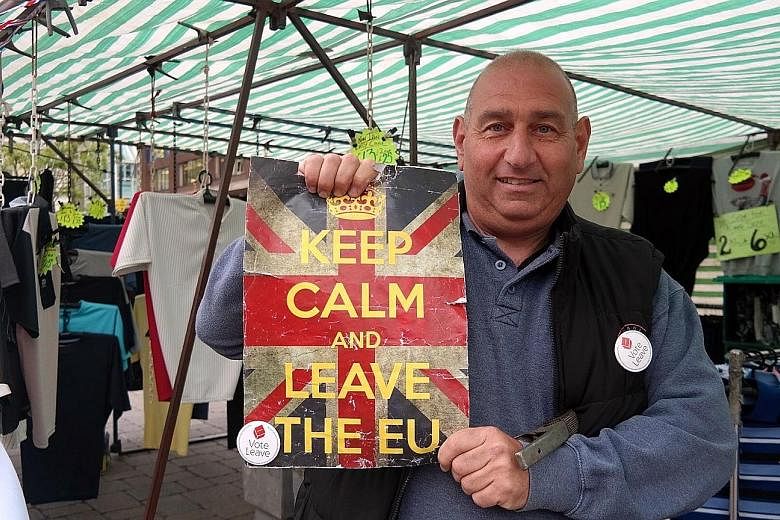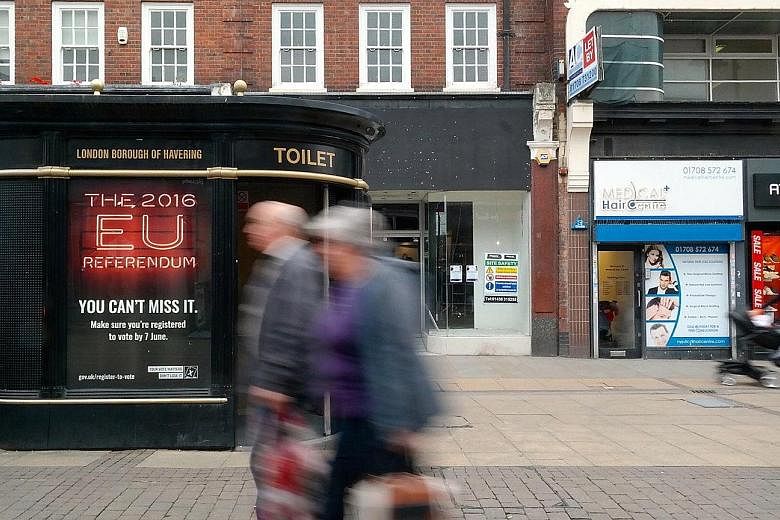It isn't hard to miss Mr Robert Reuben's market stall in the middle of Romford, a traditional market town in the eastern-most London borough of Havering.
Plus-size men's shirts hang from every hook and chain under a tarpaulin sheet, fronted by a line of Union Jacks and a well-worn poster that says: Keep Calm and Leave the EU.
Mr Reuben, a big man himself, proudly wears a Vote Leave button on his chest. His wife is Thai, his son works in Germany, but the 58-year-old wants his country to get out of the European Union because he has had enough of the "immigration problems".
"My great-grandparents came from Russia. In those days, you could take immigrants," he said.
"These days, we have got no infrastructure for it. I have had four or five immigrants come to my stall today. You start talking to them and they don't understand a word of English. I am not an expert, but I know my feelings."
Romford is the biggest town in Havering, a borough with a population of 237,000. Besides its high concentration of bars and clubs and its links to footballer Frank Lampard (born here) and electronic band Underworld (live here), it now has another claim to fame.
Along with other wards like Hornchurch, Upminster and Rainham within the borough, it is now known as the most eurosceptic area in Britain, according to a survey by pollster YouGov.
Mr Gerard Batten, a Member of the European Parliament and a co-founder of the pro-Brexit UK Independence Party (UKIP), told The Straits Times: "Romford is still full of ordinary, working-class, patriotic British people who are the biggest supporters of the United Kingdom leaving the EU, who feel the effects of EU membership most acutely in, primarily, mass immigration, which has meant the driving down of wages for people at the bottom end of the economic scale and the driving up of property prices."
His right-wing party - which has often been labelled anti-immigration - has six elected members on the Havering council, more than in any other borough in London.
In January, the council also became the first in Britain to vote - 30 to 15 - for Britain to leave the EU.
Politicians, the International Monetary Fund and the Bank of England have all prophesied economic gloom and doom after a British exit, but none of that matters as much to Havering residents as putting a stop to the flow of immigrants that they say is choking the country.
"We cannot take any more foreigners. There are too many in the country now. The hospitals are full, the schools are full. England, we are sinking with the weight," said Mr Barry Pearson, 78, who sells belts at the market.
"Where I live, they are building houses, but who is going in them? The English are not getting them. You have an English person who applies for housing and he has got no children. Then you have a foreigner who has got four or five children and they are putting him in front. Why? We have been treated very unfairly."
Ironically, Havering is one of the least diverse boroughs in London, with 83 per cent of its population being white British.
It did, however, see the biggest jump in ethnic minority residents - from 8 per cent to 17 per cent - between 2001 and 2011, when the census was last conducted.
Local representatives speak of increased competition from immigrants for health services, public housing, jobs and school places.
Mr David Johnson, a UKIP councillor in Havering, said: "We want to build a fairer immigration system, so we can have anybody we want from anywhere in the world, whether it is nurses or doctors or engineers. We don't want to have everybody to come here who might be totally unskilled and depriving our people of jobs."
But Romford-born-and-bred Sam Gould, who contested to be its MP in last year's general election at the age of 23 on a Labour Party ticket, said Havering has not been negatively affected by immigration.
Built primarily by working-class London East Enders who decided to move away from the city into the suburbs, it has the highest proportion of people over 65 in London.
"They are going to be voting emotionally," said Mr Gould of Havering's older generation.
"Since the financial crash of 2008, people have felt more insecure and working-class people are especially fearful. They have been wanting to vote against something, against neo-liberalism and economic insecurity. Voting to leave the EU is a vote for change, a vote against the current order."
Ms Patricia Rumble, another UKIP councillor in Havering, feels Britain has given up too much for the EU. "I want to make our own rules. The EU has got far too much influence in this country," she said. "There are 180 countries out there that are not in the EU. And we want to be free to do our own trading deals with these countries."
Mr Batten agrees that he has not had to do much persuasion in Havering. "I am not bothered about Havering. I know 90 to 95 per cent are going to vote to leave," he said. "My job is to go around London and I am personally surprised how positive it has been despite the government's scaremongering tactics."
In the other camp, Mr Gould knows his borough will choose to get out of the EU at the referendum on June 23.
"It is going to be high, I have no doubt," he said of the number of Brexit voters.
When constituents say they worry about job security, he explains to them the benefits that EU membership brings, including protection of workers' rights, paid maternity leave and equal salaries.
In recent years, young families have also moved into the suburban neighbourhoods, driven out by runaway property prices in inner London.
"I think lots of young people don't bring up the issue as much on the doorstep, while older people are passionate about it," said Mr Gould. "Young people are just not as vocal, but they are voting in."
At least one of the "oldies" in Havering is not swayed either way. Retired secretary Helen Stone has yet to make up her mind.
"Some things you read, and you think, 'oh goodness, that is not good'. Then you read another thing, and it is good. So I don't really know what I am going to do. I am really undecided and I am usually not that way," she said.
"I am 81 years old. Whatever happens is not going to change my life too much as far as I'm concerned."
SEE OPINION


